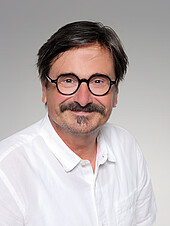Prof. Dr. Peter Rahn

Diplom Sozialpädagoge (FH), Diplom Pädagoge
Professor of Social Work Science
Dean of the Department of Social and Health Care (FB IV)
C1 .235
+49 621/5203-545
+49 621/5203-569
peter.rahn@ 8< SPAM protection, please remove >8 hwg-lu.de
to the course documents in OLAT ...
Teaching areas
- Theories of social work
- Casuistry/case work
- Social work as education, upbringing and care in childhood
- Qualitative research methods in social work
- Pedagogy of social work
- Education (theoretical approaches) in social work
Main areas of research
- Social disadvantage of children and young people and their coping strategies
- Education in social work
- Child and youth poverty
Professional career
| 1985 - 1990 | Studied social pedagogy at the Catholic University of Applied Sciences in Freiburg im Breisgau |
| 1995 - 1998 | Studied education at the University of Education in Freiburg im Breisgau |
| 1990 - 1999 | Professional activities mainly in socio-educational child and youth education, especially at the Naturfreundejugend Baden and the Arbeiterwohlfahrt Baden |
| 1999 - 2001 | Research assistant at the University of Mannheim, professorship for business education |
| 2000 - 2005 | Research assistant at the University of Applied Sciences Jena, Department of Social Work |
| 2003 | Doctorate (Dr. phil.) at the Friedrich Schiller University Jena |
| 2005 - 2006 | Lecturer for methods and forms of work in social work at the University of Cooperative Education in Gera, Department of Social Work |
| 2006 - 2010 | Professor of Social Work at the University of Applied Sciences St. Gallen (CH), Department of Social Work |
| Since 2010 | Professor of Social Work Science at the Ludwigshafen University of Business and Society, Department of Social and Health Services |
Memberships
- German Society for Social Work (DGSA)
- German Society for Educational Science (DGfE)
Publications (selection)
- Rahn, Peter (2024): Child poverty in Germany. Introduction to important aspects of the discourse. In: Peter Rahn and Sabine Zimmermann (eds.): Understanding and combating child poverty. Introduction to basic perspectives. Opladen & Toronto. S. 15-38.
- Rahn, Peter (2024): Who hears the voice(s) of children in the child poverty discourse? Socio-pedagogically inquired. In: People magazine 1/2024. p. 29-35.
- Rahn, Peter (2023): Poverty-sensitive action in child and youth welfare as part of a strategy to combat poverty. In: Forum Jugendhilfe 01/2023. p. 44-50.
- Chassé, Karl August and Peter Rahn (2020): Child poverty, milieu and education. In: Peter Rahn and Karl August Chassé (eds.): Handbuch Kinderarmut. Opladen & Toronto. S. 134-142.
- Rahn, Peter (2020): Child poverty and the children's perspective. In: Peter Rahn and Karl August Chassé (eds.): Handbook on Child Poverty. Opladen & Toronto. S. 188-196.
- Buß, Imke, Manfred Erbsland, Peter Rahn, Romina Müller and Barbara Husemann (2018): Study behavior and academic success of students with children. Results of a university-wide survey. In: Imke Buß, Manfred Erbsland, Peter Rahn, Phillip Pohlenz (eds.): Opening up universities: Impulses for the further development of study programs. Wiesbaden. S. 107-131.
- Rahn, Peter (2017): Education ... and the good life of children. A socio-pedagogical consideration. In: Sabine Fischer and Peter Rahn (eds.): Being a child in the city. Education and a good life. Opladen, Berlin, Toronto. S. 13-26.
- Chassé, Karl August and Peter Rahn (2015): Poverty prevention between inclusion and exclusion. In: Kommission Sozialpädagogik (ed.): Practices of inclusion and exclusion in social work. Weinheim. S. 242-254.
- Rahn, Peter, Christian Reutlinger and Caroline Fritsche (2014): Neighborhood and school from a child's perspective. In: Ulrich Deinet and Christian Reutlinger (eds.): Activity - Appropriation - Education. Positioning between virtuality and concreteness. Wiesbaden. S. 189-201.
- Rahn, Peter (2013): Effects of the fairmann e.V. offer from a school perspective. A content-analytical evaluation of feedback letters on workshops for boys on the topics of anti-violence and social competence. Evaluation report. Ludwigshafen on the Rhine.
- Rahn, Peter (2011): Subjective maps - on the reconstruction of children's appropriation spaces. In: Ииститут экоиомики, управления и права (Казан)/Fachhochschule Ludwigshafen am Rhein (ed.): Методы эстетического воздействия в социалной работе - "Ästhetische Methoden in der Sozialen Arbeit". Kazan (Russia). S. 98-104.
- Fritsche, Caro, Peter Rahn and Christian Reutlinger (2011): Quartier macht Schule - The children's perspective. Wiesbaden.
- Rahn, Peter (2010): Professionalism - Reflections on current challenges. In: Petra Benz Bertoletta, Marcel Meier Kressig, Anna Maria Riedi and Michael Zwilling (eds.): Soziale Arbeit in der Schweiz. Insights into discipline, profession and university. Bern. S. 142-153.
- Rahn, Peter (2010): Lifeworld. In: Christian Reutlinger, Caroline Fritsche and Eva Lingg (Eds.): Raumwissenschaftliche Basics. Wiesbaden. S. 141-148.
- Chassé, Karl August and Peter Rahn (2010): Coping through peer integration in the transition to secondary schools - A moral economy perspective of disadvantaged children. In: Margherita Zander (ed.): Kinderarmut - Einführendes Handbuch für Forschung und Soziale Praxis. 2nd edition. Wiesbaden. S. 142-160.
- Rahn, Peter and Karl August Chassé (2009): Children in Poverty in Germany - Reflections on Recent Social Work Research. Journal of Social Work Practice, Vol. 23, No.2, June 2009, pp. 243-252.
- Schäfer, Erich, Stephan Eschler, Peter Rahn and Sandra Uhl (2006): "Wer versteht sich, versteht auch andere besser" - Eine Längsschnittstudie zu Wirkungen eines Projekts der politischen Jugendbildung des Demokratie-Lernen. Jena.
- Ludwig, Heike and Peter Rahn (2006): Fachhochschule und gesellschaftliche Praxis - zur Rolle der Fachhochschule der Departments Sozialwesen in den neuen Bundesländern. In: Birgit Bütow, Karl-August Chassé and Susanne Maurer (eds.): Soziale Arbeit zwischen Aufbau und Abbau. Transformation processes in East Germany and child and youth welfare. Wiesbaden. S. 149-160.
- Rahn, Peter (2005): Transition to employment. Coping strategies of young people in disadvantaged life situations. Wiesbaden.


